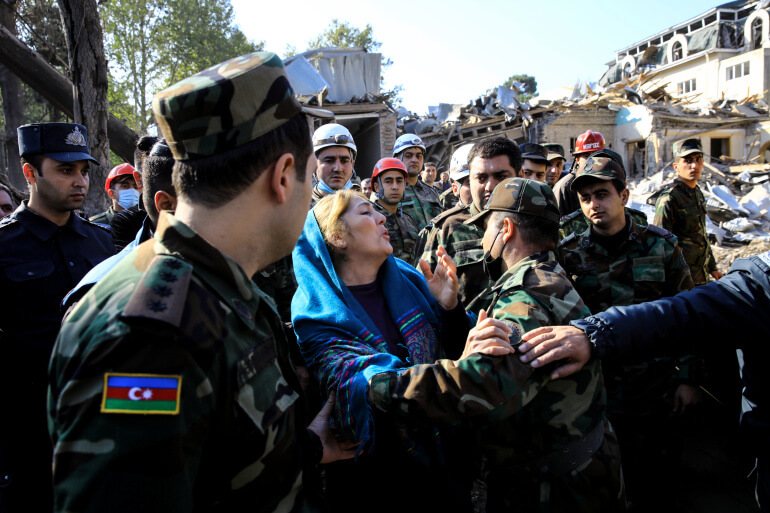Officials from Armenia and Azerbaijan have accused one another of seriously violating the terms of a Nagorno-Karabakh region (NKR) ceasefire agreement signed under Moscow’s auspices on Friday. Less than 24 hours after the deal was signed following emergency tripartite talks with the foreign ministers of the three countries, Azerbaijan reported nine deaths from Armenian bombardment in the city of Ganja. At the same time, Yerevan has claimed intense shelling by Azeri forces in Stepanakert, the capital of NKR, as well as other cities in its sovereign territory.
The ceasefire pact was drawn up following 10 hours of intense discussions between Russian Foreign Minister Sergey Lavrov and his Azerbaijani and Armenian counterparts—Jeyhun Bayramov and Zohrab Mnatsakanyan, respectively—with the humanitarian intention of halting violent hostilities in the disputed region. Further, as per the joint statement released by the three leaders, it called for the exchange of captured prisoners of war and the bodies of victims under the facilitation of the International Committee of the Red Cross (ICRC). “Detailed parameters of the ceasefire regime will be agreed upon in the near future,” Lavrov told reporters.
The talks in Moscow, which were advocated by Russian President Vladimir Putin, marked the first diplomatic engagement between Baku and Yerevan since fighting between the two sides escalated on 27 September, resulting in the loss of hundreds of lives. The resultant document also states that Armenia and Azerbaijan have agreed to engage in practical talks on a peace settlement in NKR mediated by the OSCE Minsk Group. The group is co-chaired by representatives from Russia, France, and the United States. “All involved parties have confirmed their adherence to the invariability of the negotiating process,” the statement highlighted.
See also: Is it Prudent for Russia to Mediate the Armenia-Azerbaijan Conflict Alone?
However, Azerbaijan’s President Ilham Aliyev told Russian news outlet RBC that, while the warring neighbours were looking towards a political settlement to the issue, further fighting should be expected. He said, “We’ll go to the very end and get what rightfully belongs to us.”
Meanwhile, Eteri Musaelyan, the ICRC representative in Karabakh, said on Sunday that the mission has been finding it increasingly difficult to begin the exchange as news of ceasefire violations from both sides keeps coming in. “In order for us to begin working it is necessary to wait for the observation of the ceasefire regime. On both sides of the line of contact, there are constant media reports that the shelling is underway, that there are casualties. Until a complete ceasefire and safety guarantees for our staff are in place, our neutral mediation cannot come into effect,” she told TASS.
The European Union’s High Representative for Foreign Affairs and Security Policy, Josep Borrell, also spoke to top diplomats from both sides to call for adherence to the ceasefire. “There is no military solution to the conflict. The only way forward is the return to negotiating table without preconditions under OSCE Minsk Group co-chairs,” he said via Twitter.
On the other hand, Dmitri Trentin, a former Russian army colonel and current director of Carnegie’s Moscow Center, said that any peace talks for this conflict are likely to fail. This is because Baku will never give up on pressing for Armenia to revoke its forces from the disputed enclave, which Yerevan is highly likely not to accept. “For Russia, the most important issues in the South Caucasus are the security of Russian borders from jihadis coming from the Middle East and elsewhere, and Turkey’s rising role in the region,” he said, adding, “This means that Moscow can’t walk away from the Nagorno-Karabakh conflict and allow a war to rage”.

